PACKAGE DUE OCT. 15 WILL INCLUDE LAST YEAR'S 35TH ANNIVERSARY REUNION AT TRIBECA
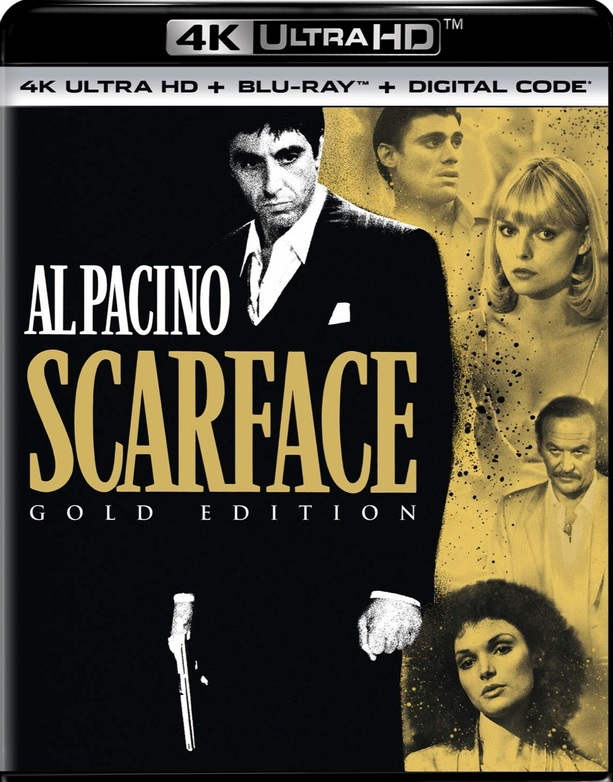
 Hello and welcome to the unofficial Brian De Palma website. Here is the latest news: |
|---|
E-mail
Geoffsongs@aol.com
-------------
Recent Headlines
a la Mod:
Listen to
Donaggio's full score
for Domino online
De Palma/Lehman
rapport at work
in Snakes
De Palma/Lehman
next novel is Terry
De Palma developing
Catch And Kill,
"a horror movie
based on real things
that have happened
in the news"
Supercut video
of De Palma's films
edited by Carl Rodrigue
Washington Post
review of Keesey book
-------------
Exclusive Passion
Interviews:
Brian De Palma
Karoline Herfurth
Leila Rozario
------------
------------
| « | August 2019 | » | ||||
| S | M | T | W | T | F | S |
| 1 | 2 | 3 | ||||
| 4 | 5 | 6 | 7 | 8 | 9 | 10 |
| 11 | 12 | 13 | 14 | 15 | 16 | 17 |
| 18 | 19 | 20 | 21 | 22 | 23 | 24 |
| 25 | 26 | 27 | 28 | 29 | 30 | 31 |
De Palma interviewed
in Paris 2002
De Palma discusses
The Black Dahlia 2006

Enthusiasms...
Alfred Hitchcock
The Master Of Suspense
Sergio Leone
and the Infield
Fly Rule
The Filmmaker Who
Came In From The Cold
Jim Emerson on
Greetings & Hi, Mom!
Scarface: Make Way
For The Bad Guy
Deborah Shelton
Official Web Site
Welcome to the
Offices of Death Records

Fiore collaborated with Brian De Palma on several films in the 1960s. Along with Bruce Rubin, Fiore did a little of everything in the De Palma camp. He was the sound recordist on Murder A La Mod (a clip from which ended up playing on a TV in a scene from Blow Out years later). Fiore was the cinematographer on Greetings, and shortly after, co-filmed the split-screen documentary of Richard Schechner's Dionysus In '69 with De Palma and Rubin (the latter recorded the film's sound). Fiore was the cinematographer on To Bridge This Gap, a documentary by Ken Burrows and De Palma, which was edited by Rubin.
There was one other project, a lost documentary from earlier in the 1960s that was to be titled Mod. Fiore, De Palma, Rubin, and William Finley had all shot footage in England. It was Finley's idea, circa 1964, a movie about mods and rockers within a then-burgeoning scene in London. In Justin Humphreys' book, Interviews Too Shocking To Print, Rubin explains that Finley's father had died and left him money, which he was going to use to finance the film. "And I was amazed at the audacity of somebody taking money that they had inherited and immediately spending it on making a movie," Rubin tells Humphreys. "But he was so enthralled by what was going on in London - the whole new music scene and he wanted to document it - to get it on film before it went away because this was the moment of birth for that whole [movement]. I mean, The Beatles were just coming out, and The Stones, and everybody - The Animals, Herman's Hermits, on and on."
After arriving in London ("there was a whole group of us," Rubin says in the book), Finley asked if Rubin would go to France with De Palma to pick up a light Eclaire sound camera, mentioning that he also needed another person to work on the film. Rubin had known Fiore from film school, and De Palma had known Fiore, as well. Fiore happened to be on a Fulbright grant in Paris, "and so he agreed to come back from Paris with us to work on the film," says Rubin, adding that they all had "an incredible two days" in Paris before heading back to London, where they worked on the film for two weeks, "through Christmas and New Year's."
Rubin continues in Humphreys' book:
"Bob Fiore and I went to Birmingham, I think... We drove up there and we went to the Beatles' Cavern (The Cavern Club in Liverpool] and there was a group showing there that night called Herman's Hermits. We got permission - I had a card that said I was from ABC News. I don't know how I got it but people thought that's who I was. They made a lot of things available. We went in and I had enough film to shoot one act of the concert. And it was Herman's Hermits, so I got the camera and Bob Fiore was my sound man at that point. I shot this amazing, exciting number using every element of the zoom lens. It was really very, early '60s exciting experimental cinema. I really shot a great roll of film of Herman's Hermits."And then, right after it was done, and we were out of film, the announcer onstage says, 'And, now, everybody - here's Herman!' I had shot the whole backup group without their leader, so I had wasted every bit of film of some of the most brilliant filmmaking of all-time.
"We were very ragtag as a group and we did what we could do. We did shoot some stuff of a group called The Who in a room in a hotel but nobody had ever heard of them, really, but people were saying, 'This is going to be a big group.' It was a small hotel performing area in a restaurant, like. I did shoot some of their performance."
Fiore went on to work with the Maysles brothers as a camera operator on Gimme Shelter (1970), and was a cinematographer on a key Vietnam documentary, Winter Soldier (1972), in which former U.S. soldiers testify in Detroit about their experiences in Vietnam. Fiore was a co-director and cinematographer on Pumping Iron (1977), the doc that made a star of Arnold Schwarzenegger, and he was a camera operator on Robert Townshend's Eddie Murphy: Raw (1987) and Al Pacino's Looking For Richard (1996).
Milestone Films shared some words from Fiore's daughter, Jessamyn: "My father was a really good man. That description may seem overly simplistic but I think we can all agree that actually, at this moment, being a good man is a great accomplishment. He was incredibly generous; he had a talent for making people feel at ease and welcome. This was the skill that made him such a great documentary cinematographer — putting people at ease in front of the camera — but also made him a great friend, a trusted confident, and a wonderful father.… He was a modest man, but also very proud of the films he made, proud of their endurance and continued relevance, knowing they could be experienced long after he was gone.”
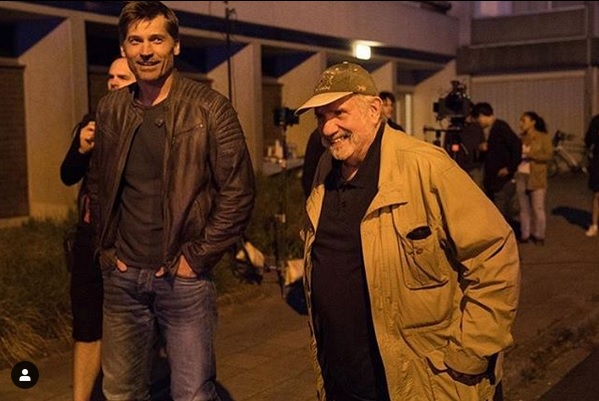
It’s something that has repeatedly happened over the years. Legendary director Brian De Palma released a new movie that was shrugged off as a minor work from the filmmaker despite its singular vision and meticulously crafted set pieces. This spring when De Palma’s Domino was released in select theaters and VOD, I, too, thought the film was a minor work from De Palma that featured two incredible sequences. I can’t believe that I, an absolute De Palma fanatic, made the same mistake that so many others had made. I undervalued a new De Palma flick. Revisiting Domino for its Blu-ray release, I was struck that De Palma has once again made an absolute killer thriller, a cynical film with strong political overtones and the director’s incredible knack for crafting suspense in the vein of Alfred Hitchcock. Simply put, despite what anyone has said, Domino rips."DAD AT THE MOVIES" SEES CUTS WHERE NONE EXIST...?...
The screenplay for Domino by Petter Skavlan taps right into Brian De Palma’s cynicism, especially when it comes to American international interventionism. Look throughout De Palma’s filmmaking career and you see example after example of this robust skepticism about America’s ability to dictate its wishes to the world and Domino fits right in that mold, embodied by the brash, outlandish performance by Guy Pearce. Within the world of Domino, which is set in 2020, the reality of American involvement means that a rather simple murder case becomes increasingly complicated, with the CIA pull string behind the scenes and creating layers of distrust even amongst allies.
The way in which Domino features Islamist terrorists has caused a bit of an uproar because of the stereotypical nature. But De Palma injects a few wrinkles that take the director deeper into what terrorism truly is. He’s not interested in the religious motivations for terrorism, but how technology and visual storytelling can be used to spread the horror. Al Din and his cabal of terrorist cohorts speak of their religious jihad but they’re more focused on creating glossy portraits of terror, sensationalized videos of violence that will dominate news cycles and spread on the internet. De Palma is fascinated to see how easily his beloved visual medium can be utilized to spread evil.
Unfortunately, behind the scenes issues between the producers and De Palma have led to the director to all but abandon his film. The Blu-ray for Domino sadly boasts no special features. While one of the great American filmmakers continues to languish outside of the Hollywood system, he proves once again that when given the resources he can craft a sequence as good if not better than anyone. Domino is another highly cinematic work from Brian De Palma that dives into themes that the director has been exploring throughout his career, going all the way back to his breakthrough hit Greetings in the ‘60s. Time will tell if people finally get around to catching up with Domino, but I have a feeling that De Palma’s latest will build its dedicated cult following as it shows once again the master hasn’t lost his touch.
Dave Taylor, Dad at the Movies
This genre is propelled by action sequences, and director Brian De Palma offers up some exciting set pieces, first with the attack that results in Lars’ death and a 007-worthy rooftop chase, then a gripping sequence at Spanish bullfight. The film itself is typical De Palma too, self-conscious of its medium even as it’s slyly self-referential. For example, a video posted by the terrorists is analyzed by the police for its use of camera angles and sophisticated cinematography techniques. Later, one of the terrorists attacks a film festival in a sequence told through video sequences watched on various computer laptops, a film-within-a-film.Eriq Ebouaney has so much presence on camera that I also really wished for more of his story, more about Ezra Tarzi, his family, and how he ended up stuck in the middle between the Danish police, the CIA and ISIS. He’s an actor to watch, for sure, and has already had great success in Three Days to Kill, Kingdom of Heaven and Hitman.
Still, there’s a lot wrong with this story, not the least of which is that Christian is a miserable cop, so busy saying goodbye to his female friend that he forgets his gun as he heads out on patrol. He’s later suspended from the police force for such negligence, but that entire sequence – and its consequences in the subsequent story – are quickly subsumed and never appear again in the narrative. There are also long periods when Christian and Alex are driving or tailing the terrorists where there’s a weird absence of dialog. Moody? Yes, but in the “are we there yet?” sense.
What’s more frustrating is the lazy and somewhat insulting tendency of De Palma to zoom in on something to clue us in that it’s important to the story. This doesn’t just happen once (gun on table, cut to naked woman, cut to Christian walking out the door, cut and linger on gun still on table) but recurs throughout the film. Entirely suitable for manga, it’s a pet peeve of mine in cinema. Let us figure it out, don’t break the narrative with these foreshadowing close-ups or oh-so-obvious placements on camera.
There are a lot of pretty awful movies out there, however, so in the end I would assess Domino as a B grade film. If you like actioners, if you’re a big fan of Coster-Waldau (I am!) and van Houten (I am!), if you are a Brian De Palma completist, or you’re just looking to burn a few hours, Domino is mostly well assembled and muchly fun to watch. I’m just hoping for the director’s cut that chops out some of the banal elements and smooths the many narrative hiccups and cuts to weave the main story with the many secondary narrative elements. Now that would be a really good cop film.
 Readful Things makes limited, customized action figures for all kinds of horror movies. Today, the artist behind Readful Things posted this out-of-the-blue wow Raising Cain figure to their Instagram page, with the caption, "Rectifying my lack of John Lithgow figures." As of yet, this piece has not showed up for sale or Ebay auction, and not sure if it will or not. For now, just the idea of it seems amusing enough...
Readful Things makes limited, customized action figures for all kinds of horror movies. Today, the artist behind Readful Things posted this out-of-the-blue wow Raising Cain figure to their Instagram page, with the caption, "Rectifying my lack of John Lithgow figures." As of yet, this piece has not showed up for sale or Ebay auction, and not sure if it will or not. For now, just the idea of it seems amusing enough...
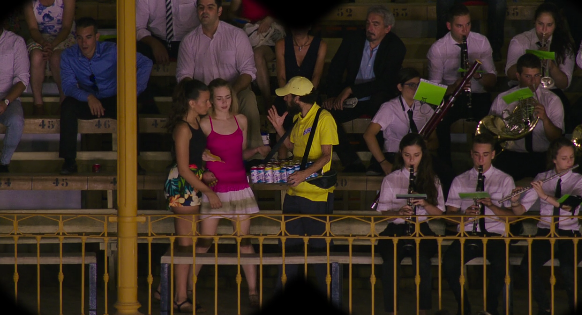
Relegated to a VOD release, final cut snatched from its director [*questionable statement], bearing the marks of a rushed and underfunded shooting-schedule, and visually incomplete to boot, Brian De Palma’s DOMINO has all the warning signs of a real cinematic disaster. And yet, the experience of watching the film is, at times, at odds with these facts.For all its occasional jankiness, DOMINO begins brilliantly. Set in Copenhagen, in 2020, nondescript cop Christian (Nikolaj Coster-Waldau) and his partner Lars (Soren Malling) are called to an apparent case of domestic violence. This scene is preceded by an extended shot, in Christian’s apartment, which provides a crucial detail: he has left his gun behind. As they enter the lift, they bump into Ezra (Eriq Ebouaney), whose feet are wet with blood. He stabs Lars in the neck, and a VERTIGO-quoting rooftop chase is initiated, ending with Ezra captured by CIA (led by an enjoyably hammy Guy Pearce), and Christian dealing with the aftermath of his friend’s attack.
Ezra, who is an ISIS-affiliated terrorist, becomes a brutal enforcer for the CIA in Denmark, depicted as an EU police-state under the Americans’ watchful aegis. Christian, meanwhile, is reprimanded for forgetting his gun and begins investigating the terrorist network (operating as fast-food sellers, hiding explosives in tomato crates) with Alex (Carice van Houten), whose motivations are more tangled than they first appear.
Much of this – the ‘drama’ – is plainly bad; many scenes are staged with a perfunctory, even bored, eye-rolling manner, others are barely colour-corrected; the high-strung score is ramped up to alert you of some impending action, only emphasising how dull what’s happening presently is; and the performances are hilariously, stoically wooden. Coster-Waldau particularly seems to have been inspired by Ben Affleck’s turn in Terrence Malick’s TO THE WONDER: he’s a living slab, essentially part of the scenery — he can run, he can fight, he can look vaguely in the direction of another actor in a scene, but can he emote? Are you joking? No chance.
But, should you be able to suffer through this, there are shots, sequences, scenes which demonstrate that unmistakable and inimitable De Palma touch. This is another way of saying that the director’s ‘provocative’ — a dread term — leanings are in evidence here, and they are as nasty, irresponsible, precisely articulated, and expressive as ever.
De Palma strikes at where we live – he sets fire to shit-filled bags and leaves them at our complacent doors. DOMINO is another instalment in the director’s filmography concerned with our relationship with images and screens, how people can be lured into a false sense of security, or panic, by the manipulation of media. The key sequence here is one which depicts, in split-screen, first-person-shooter fashion, a terrorist attack on a film festival red carpet. The nauseating effect of the POV is doubled when it occurs to you that this might be, in a compartmentalised way, wish-fulfilment on the director’s behalf. The sequence calls to mind the unbelievable “Be Black, Baby!” sequence from De Palma’s HI, MOM! for its sheer in-your-face outlandishness.
The finale, set in an Almeria bull-fighting stadium, becomes a mission to stop both an atrocity on Spanish soil and the recording, for propagandistic purposes, of that atrocity. It’s an incoherent set-piece, for sure, but it’s assembled so beautifully with such attention to tension, recalling the structures of the delirious, musical sequence-making of DRESSED TO KILL, BODY DOUBLE, and FEMME FATALE.
Only those compelled by a sense of auteurist completionism will end up letting DOMINO into their eyes and ears, which is, in a limited way, a shame: because, despite the obvious truncated and distorted nature of the film, the marks of De Palma’s authorship are still visible, and still pleasurable. It’s all here: the ominous zooms, the axial cutting, the split-diopter shots, the mystifying chutzpah; and, to save the best until last, it’s good to note that when De Palma the sequence-constructor is allowed to emerge from the movie’s cracked casing, he can still sing.
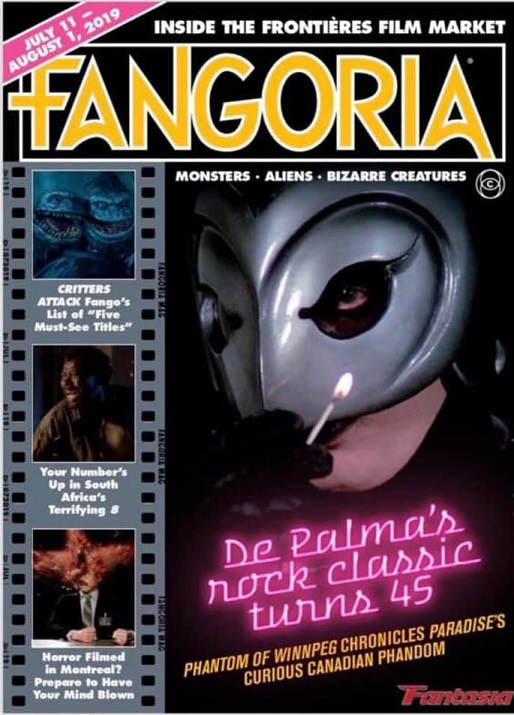 Fangoria distributed a special limited 12-page edition of its magazine at this year's Fantasia Fest, featuring Brian De Palma's Phantom Of The Paradise on the cover (shown here), marking the film's 45th anniversary. A few days ago, The Swan Archives posted a brief summary of Fantasia's Phantom events:
Fangoria distributed a special limited 12-page edition of its magazine at this year's Fantasia Fest, featuring Brian De Palma's Phantom Of The Paradise on the cover (shown here), marking the film's 45th anniversary. A few days ago, The Swan Archives posted a brief summary of Fantasia's Phantom events:Our Principal Archivist just got back home from the Fantasia Festival in Montreal, where Phantom of Winnipeg had its world premiere on Friday, July 11, and Phantom of the Paradise was screened the next night. (Winnipeg also enjoyed an encore screening on Sunday afternoon.) Somewhere around 130 people packed the Salle J.A. DeSeve on Friday, including a number of the Winnipeg fans who are profiled in the documentary. Also in attendance were directors Malcolm Ingram and Sean Stanley, as well as Paul Williams (who is interviewed briefly in the film, as is our Principal Archivist, who somehow ended up with a co-producer credit.) The film, without actually making an attempt to answer the question, "Why Winnipeg," and without taking a position on whether Paradise is actually a good movie or not, is a gentle and loving tribute to the power of fandom to change lives and create community. The plan for the screening of Paradise the following night was that Paul Williams and (Phantom producer) Ed Pressman would "host" the proceedings, with Ed receiving a lifetime achievement award from the festival for the somewhere-around-100 films he has produced, and his role in nurturing promising up and coming directors. Sadly, Ed had injured himself in a fall the day before, and was not able to attend, so, shortly before things got underway, Paul asked our Principal Archivist to moderate a Q&A with Paul, which he nervously did. We hope people enjoyed it, and maybe even heard some anecdotes they hadn't previously encountered. Ed was, fortunately, sufficiently recovered by Monday to appear at the festival remotely, via Skype, to present his scheduled master class. MEANWHILE - a dilemma is brewing in New York, as the Sleepy Hollow International Film Festival will be screening Winnipeg and Paradise and doing a tribute to Ed Pressman, all in mid-October - which is exactly when the Hamptons International Film Festival, two hours away, will be presenting Brian De Palma with a lifetime achievement award, on the occasion of which Alec Baldwin will be doing a Q&A with Mr. De Palma onstage. Why must we suffer so?
It didn’t seem to matter that Sadako was a disappointment, however. The biggest draw of the weekend, and the one that inspired the most childlike excitement in the festival-goers I talked to, was the double dip of redemption for Brian De Palma’s 1974 horror rock opera Phantom Of The Paradise. De Palma rarely talks about the film [De Palma a la Mod note: not exactly a correct statement, as De Palma seems happy to discuss Phantom whenever the subject comes up], and certainly never shows up for retrospective screenings. Star William Finley died in 2012, and Jessica Harper’s busy on the Suspiria circuit, leaving 78-year-old co-star and songwriter Paul Williams to carry the torch of the film’s small but intense—and heavily Canadian—“phandom.” I confess I spent much of the weekend trying to understand the question of why Canada, and specifically Winnipeg, loves this obscure ’70s artifact so damn much, never realizing that I was humming the answer to myself the whole time. It’s stuck in my head right now, in fact.No one sang along at the 45th anniversary screening of the film on Saturday night, which was held in an appropriately baroque movie palace in downtown Montréal outfitted with marble statues and red velvet seats. Although it shares certain aesthetic qualities with The Rocky Horror Picture Show, The Phantom Of The Paradise inspires much less audience participation: The self-proclaimed “‘Peggers” in the crowd clapped along with Williams’ Swan when he slaps his gloved hands together three times in the opening scene. But that was it. The rest of the film, whose offbeat glam-rock theatricality I appreciate more every time I see it, unfolded in hushed silence, before the eruption of standing ovation as Williams took the stage for a post-film Q&A. Williams was audibly moved as he thanked the crowd for their undying support, telling them that it was because of them the movie lives on. They loved that.
It was heartwarming to recognize a few Winnipeggers on screen the following morning at a screening of Phantom Of Winnipeg (Grade: B), a crowdfunded documentary that sets out to answer my exact question of why Winnipeg, Manitoba is one of only two places in the world where Phantom Of The Paradise was a hit. (The other was Paris, where the future members of Daft Punk met at a screening.) And the film comes close to providing real insight into the question, going beyond the usual “isn’t this fun” platitudes of a fan documentary to explore how growing up in a cold, isolated area like Winnipeg shapes a person’s sensibilities, as well as how the internet has changed the nature of fandom. That being said, the inclusion of Kevin Smith, whose obsession with Canada is funny but more than a little patronizing, draws attention away from the fans, all of whom are great characters in their own right. One man, who plays in a Phantom cover band and offers to trade his buddy a black Gibson Flying V for a signed copy of the soundtrack, says he saw it 50 times in its initial run. Another woman shows off her handmade Phantom purse, with the Death Records logo on one side and “Trust Me. -Swan” cross-stitched onto the other.
In preparation for this year’s Fantasia Film Festival, I looked over my coverage from last year and was utterly shocked that I forgot to mention the presence of Joe Dante, director of many pop-film masterpieces like Gremlins, Small Soldiers, and Gremlins 2: The New Batch. Joe Dante is a master filmmaker, no doubt, but in the face of emerging genre stars (like the minds behind Cam, Daniel Goldhaber and Isa Mazzei, whom I can genuinely claim to being into Before They Were Cool) it can be easy to ignore the celebrities of Fantasia. But this year, that celebrity is the impossible-to-ignore Paul Williams, star of the 1974 rock opera Phantom of the Paradise. This bonkers, terrifying, hilarious film, one of the first from certified maniac Brian De Palma, was, of course, a massive bomb in North America. Well, everywhere except one place: Winnipeg, where the film made even more than Star Wars and Jaws, and endures till this day.That seems like one of the made-up Winnipeg factoids that one would find in Guy Maddin’s seminal half-documentary My Winnipeg, but it’s completely true. Phantom of Winnipeg is a documentary about the Winnipeg fans of Phantom (Peggers, as they’re called numerous times by Paul Williams himself, amusingly), more concerned with documenting the purity and joy of their fandom than investigating why it sprung up. It’s a brilliant punchline to watching the film for the first time: you’re drowned in colour and rock and fear and that glorious Phantom getup, and then you learn that the place which wholeheartedly embraced the film was a cold, orderly Canadian city with a dark underbelly; perhaps the most secretive city in all of North America. In my experience, Montreal prefers to wear its weirdness on its sleeve, which is what Fantasia is all about.
 And finally, back to Fangoria, whose Editor-in-Chief Phil Nobile Jr. tweeted a week ago that he "was honored to get to speak to Paul Williams" the day before, about Phantom Of Winnipeg and Williams' journey with Phantom Of The Paradise. In the tweet, Nobile included the pic seen here to the left, as well as a pic of his "Invocation" editorial from the Fantasia Fest edition of Fangoria (see image below). Nobile added that he hopes to expand on this Phantom editorial "in a future issue of the mag."
And finally, back to Fangoria, whose Editor-in-Chief Phil Nobile Jr. tweeted a week ago that he "was honored to get to speak to Paul Williams" the day before, about Phantom Of Winnipeg and Williams' journey with Phantom Of The Paradise. In the tweet, Nobile included the pic seen here to the left, as well as a pic of his "Invocation" editorial from the Fantasia Fest edition of Fangoria (see image below). Nobile added that he hopes to expand on this Phantom editorial "in a future issue of the mag."
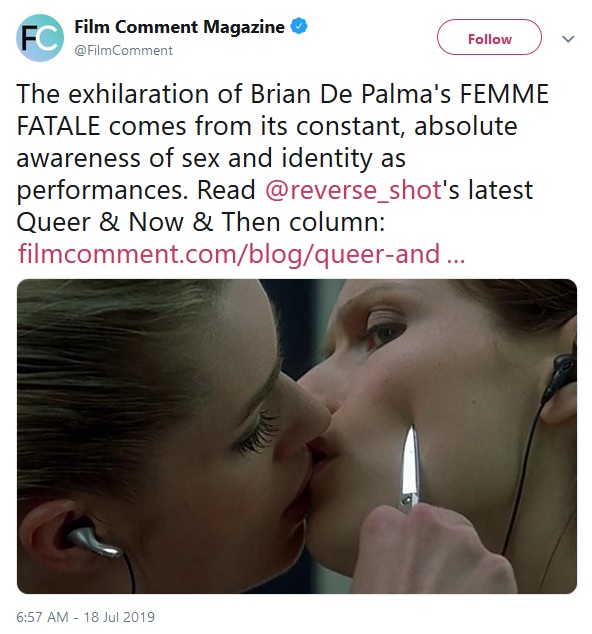
For a director whose cinema would seem straight as a razor, Brian De Palma’s films radiate an undeniable queer energy. This unrepentant male gazer is perhaps an odd candidate for queer study, yet there are multiple avenues worth exploring that could help explain how De Palma has managed to penetrate the consciousness of many a gay viewer, this one included. I can name at least 10 gay-identifying critics off the top of my head who are entrenched fans, and I would argue that the intense appeal his films hold for us goes beyond visual voluptuousness or camp—though such matters are not incidental—and into a deeper, subconscious realm that rejects fixed identities, embraces marginalization, and acknowledges the integrity, even the necessity of social performance. De Palma’s dream states—and his dreams-within-dream states—are not merely alternate realities; they represent lives outside of normative functions. The false, bottomless narratives of some of his best thrillers—Sisters, Dressed to Kill, Body Double, Raising Cain, Femme Fatale, Passion—contribute to an outrageous kind of sensuousness that short-circuits cognitive, linear reality.Rare is the De Palma movie that prizes or reifies standards of normalcy, heterosexual or otherwise. There is a radical empathy at work, for instance, in Carrie (1976), which encourages identification with an ostensible “monster,” making it all but impossible to feel a deep, nearly spiritual connection to a mercilessly bullied outcast. Even Dressed to Kill (1980), a film that could easily be tagged as transphobic, functions on an emotional gut level primarily because it engenders sympathy for all of its main characters, each of whom is socially marginalized and thus in one way or another exists outside of traditional, progressive roles: Angie Dickinson’s sexually starved housewife, Nancy Allen’s persecuted sex worker, Keith Gordon’s lonely teen geek, and, most importantly, Michael Caine’s killer psychiatrist, whose trans identity, in the film’s crass, hothouse B-movie logic, is akin to a murderous split personality disorder, an extreme, R-rated riff on Norman Bates. Employing and slyly parodying Psycho’s psychiatric diagnosis, Dressed to Kill is an uncloseted, unbound film that exists at the intersection of various characters’—and viewers’—erotic fixations. Perspective is of paramount importance in De Palma’s films, not just because of the complex networks of who’s looking and who’s being looked at but also for the ways in which we are invited to experience desire right along with the people onscreen.
I’ve long found Femme Fatale to be De Palma’s queerest film, both for explicit narrative reasons and for something more connected to aesthetic perspective. The exhilaration of his 2002 thriller comes from its constant, absolute awareness of sex and identity as performances and the manner in which it unabashedly, knowingly lures the viewer into its world of luxurious game playing. In De Palma’s films, desire becomes spectacle, an unavoidable and somewhat serious extension of the director’s oft-reiterated belief that people go to the movies to watch women. “People have been looking at beautiful women since the beginning of time,” he shrugged to an interviewer at the time of Passion’s release in 2012. “All you have to do is look on your television screen or go Googling or pick up a magazine, and what do you see? Women, dressed or undressed. That’s what people are interested in.” He’s intractable on the point of visual pleasure and for decades has played enough variations on this theme to make it both persuasive and surprisingly rich. Femme Fatale doesn’t shift perspective away from De Palma’s fixations, but it so perversely and continually looks back at itself, refracting, shattering, and reconstituting its own gaze—and its characters’, and ours—that it effectively queers itself in the process.
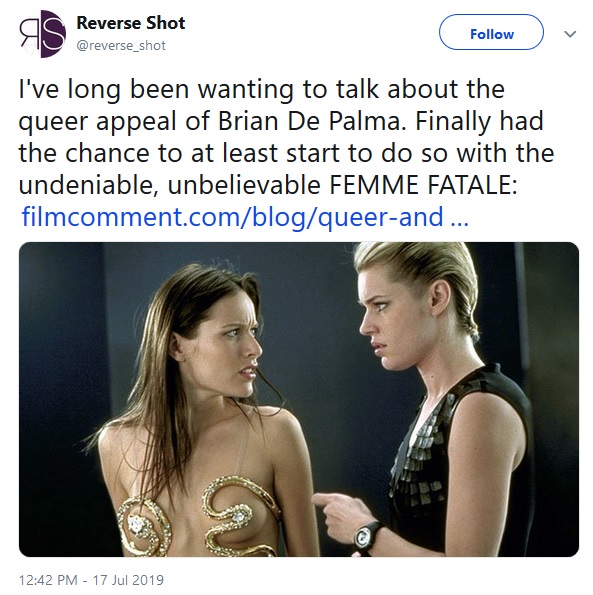
Mark Kermode: "Although contemporary reviews were mixed, Obsession is now considered to be one of De Palma's finest."
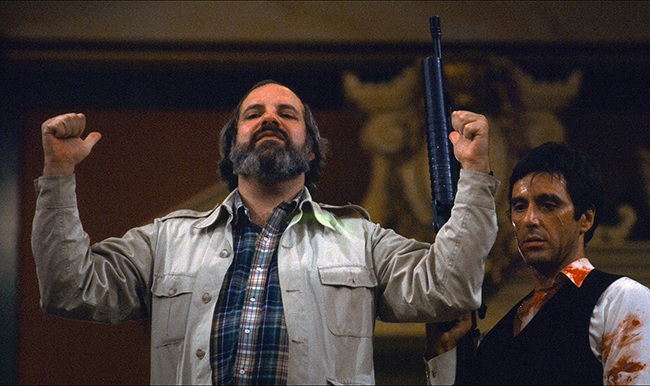
HIFF 2019 will honor legendary director Brian De Palma with a Lifetime Achievement Award, along with a special screening of one of his many award-winning films. De Palma will also participate in a A Conversation With… at the festival with Festival co-chair Alec Baldwin.Brian De Palma is an American film director and screenwriter. Some of his notable directing credits include BLOW OUT, SCARFACE, THE UNTOUCHABLES, CASUALTIES OF WAR, CARLITO’S WAY, CARRIE and MISSION IMPOSSIBLE.
"Brian De Palma’s filmography suggests one word: excitement. Few directors in movie history have generated the kinds of feelings found in Brian’s films,” said HIFF Co-Chairman Alec Baldwin. “Although he often worked with big stars and great writers, Brian is responsible for most of the excitement in his films."
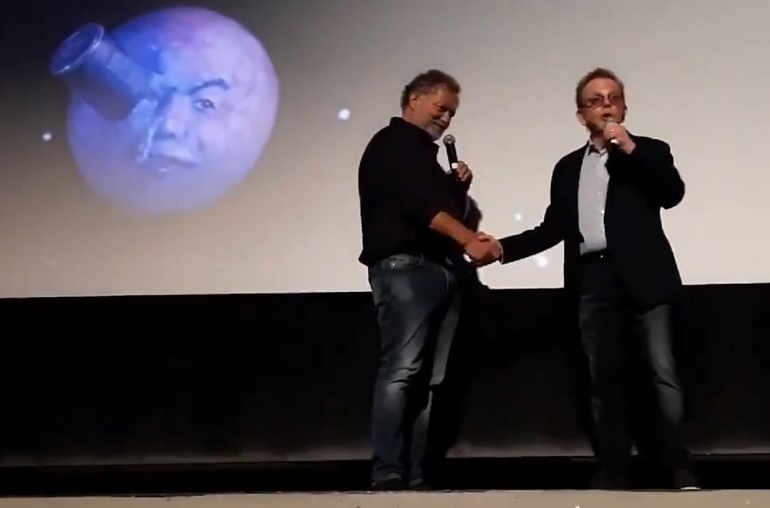
"So," Williams tells the audience as he and Kahan stand on the stage together, "one of the things that Ari did, is, he managed to find the footage that was replaced. We thought it was lost forever, but he found it. I think that was your doing, right? [applause] And he found the footage. He has reconstructed Phantom Of The Paradise with all the original [footage]. So there is this absolutely pristine version of the film, exactly the way that Brian De Palma wanted you to see it. And, we're trying to get permission to now, once again, display all of it. That's the kind of archivist that Ari is, and it's terrific." [applause]
A couple of days ago, just before the start of Fantasia Fest, where the documentary Phantom Of Winnipeg was about to have its world premiere, Williams wrote the following on his Instagram page:
I’ve said it before and I’ll say it again. The enthusiastic fans of Winnipeg are partly responsible for the life and career I have today. Where do you go to find a PR firm or press agent that will remain enthusiastic about a film for 45 years ... singing its praises to anyone who will listen. You go to Winnipeg. With Peggers on your side ..all things are possible! 😝 See you in Montreal! Grateful…❤️🙏🏻🌈i
On it's Facebook page, Fantasia Fest has posted the entire intro and post-screening Q&A from Friday night's world premiere screening of Phantom Of Winnipeg. In the video, shot by Eric St-Cyr, Paul Williams asks the filmmakers how they came to know Phantom Of The Paradise. Malcolm Ingram talks about catching it as a kid in 1979 and the impact of seeing Winslow's face traumatically burned in the record press, feeling like he shouldn't be seeing this. And then, even though he feels he was probably still too young to be watching these movies, he started following De Palma's work, seeing Dressed To Kill and Blow Out when he was still a kid. Sean Stanley, meanwhile, says he was working at a video store, and fell in love with De Palma's films, watching all of them, "and then when 'Goodbye, Eddie' came on, I stopped. And then for the next six months, every single person that came over to my house, I was like, 'You gotta see this. You gotta see this.'"
EBERT.COM REVIEW - PHANTOM OF WINNIPEG "CONSISTENTLY DELIGHTFUL" LOOK AT BIRTH OF A COMMUNITY
Rogerebert.com's Nick Allen was at the Fantasia Fest world premiere of Phantom Of Winnipeg Friday night, and writes about the doc, as well as a bit about the event:
Brian De Palma’s “Phantom of the Paradise” was not a hit when it came out in 1974, released to mild reviews and an even more unforgiving box office. At least, that was the case seemingly everywhere in the world except for the Canadian hub of Winnipeg, where “Phantom of the Paradise” became a fixation for seemingly any ‘Pegger (as they’re called) that had a feel for the crazy rock ’n roll in De Palma’s film. As other movies came through the city, “Phantom of the Paradise” would linger, and play shows week after week after week.A whole batch of impressionable, outsider kids were never the same, and the movie inspired them to become musicians, or to see a part of themselves they hadn’t. Canadian filmmaker Kevin Smith speaks in this movie about how these “phans” are such a select, intense bunch that they might as well have been part of an alien experiment. Watching these men and women talk with giddy smiles about “Phantom of the Paradise,” like cult members dedicated to a bonafide oddity, he’s onto something.
So goes the story of Malcolm Ingram and Sean Stanley’s documentary “Phantom of Winnipeg,” a consistently delightful collection of life stories where loving “Phantom of the Paradise” is at the center. We get to hear from many different individuals (not given title cards, making them memorable faces in a pool of a shared love), and they share not just stories of watching the film dozens of times, or of meeting their heroes. They also show off their signed vinyl records, merchandise, and even replicas of the Phantom's helmet, which had to be homemade when "Phantom" fever had first taken over Winnipeg.
Fear not if you haven’t seen “Phantom of the Paradise,” or if you do not share even a tenth of the admiration for it that these people do. The power in this documentary—right from the start—is that Ingram and Stanley celebrate the very specific chapters of their fandom, and immerse us in their geekiness while showing the sense of community. Like the most genuinely touching of films about anyone’s life, this focus then makes it universal. The passion that all of the subjects have for this movie becomes any viewer’s joy, especially as the directors seem to have an indispensable amount of stories about the power that “Phantom of the Paradise” has.
"Phantom of Winnipeg" isn’t so much about a fan community as the birth of a family, one that includes stars Paul Williams, Gerrit Graham, and Peter Elbling—they speak extensively in the film, about what this love for “Phantom” means to them, and how it lead to a gorgeous, symbiotic relationship. To see Elbling perform on stage alongside fans with the same zeal as anyone else in the room is a powerful sight, and one of many ways the documentary surpasses hagiography with its genuine touch.
Perhaps the biggest name involved with the original movie that does not speak in the film is Brian De Palma, but as crazy as this may sound, you won’t miss him—this is a story about the life “Phantom of the Paradise” had after, the meaning a text took on after its followers have passed it around; “Phantom of Winnipeg” is not so much about the ideas that birthed it, or the process of creating it, but the meaning it has to people for decades ongoing. This documentary's strong focus helps catapult the filmmaking through some shoddier-looking passages—even the collection of talking heads feel like a strong directorial choice, as you just want to listen to these people geek out. With its constantly delightful nature, it’s a universally appealing testament to how loving a piece of art—and in this case, both a soundtrack and a movie—is one of the most special connections any human being can have.
Attendees at Friday night’s world premiere of the documentary at Fantasia got to witness this love firsthand. Not only were the subjects in attendance, sitting in the front row, but Paul Williams was there as well, speaking about how the documentary came together, but more importantly about the legacy of the movie. He also stated that he hopes the story of "Phantom of the Paradise" lives on in new versions, and already had a director in mind: Edgar Wright.
Saturday night at Fantasia featured a special retrospective screening of "Phantom of the Paradise," with Williams, the 'Peggers, and producer Ed Pressman in attendance. Pair that with "Phantom of Winnipeg," and the legacy of "Paradise" comes full circle. As one of the highlighted “Phantom” fans stated regarding the decades they loved the movie: “We all saw Paul. Now he’s watching us.”
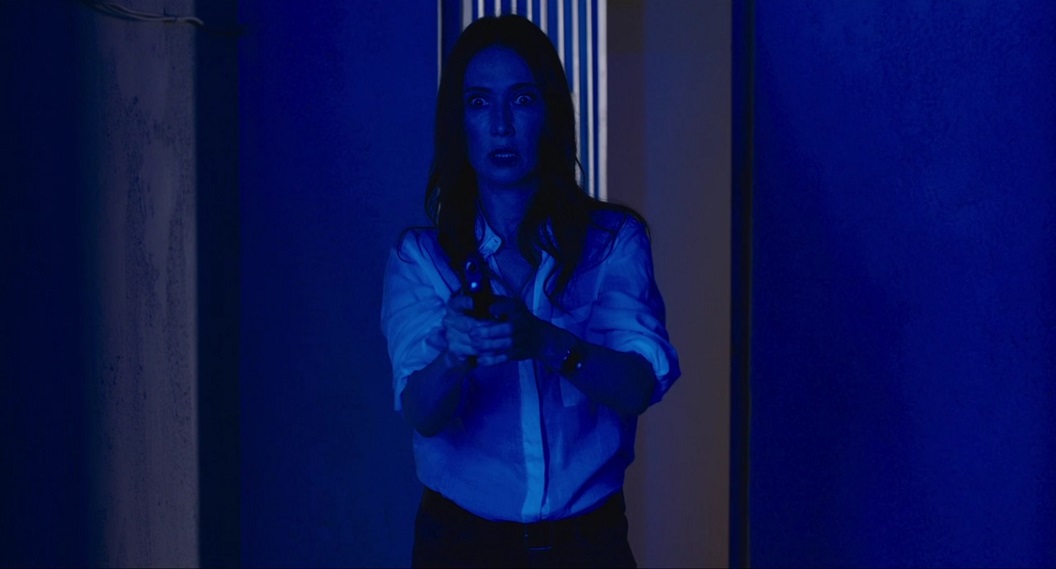
White then lists, alphabetically, "the year’s best so far," and includes Domino, writing, "Brian De Palma’s B-movie dreamscape about global distress, is uncomplicatedly political and the best kind of comeback: driven by compassion."
A couple of weeks ago, World Of Reel's Jordan Ruimy posted the results of a "critics poll," finding that Jordan Peele's Us was "named best movie of 2019 (so far) according to over 150 critics." While Armond White was not one of the "film critics, journalists, bloggers and entertainment reporters" who were polled, there was one participant who included Domino in his top five: James Morrison, a film historian at Claremont McKenna College.